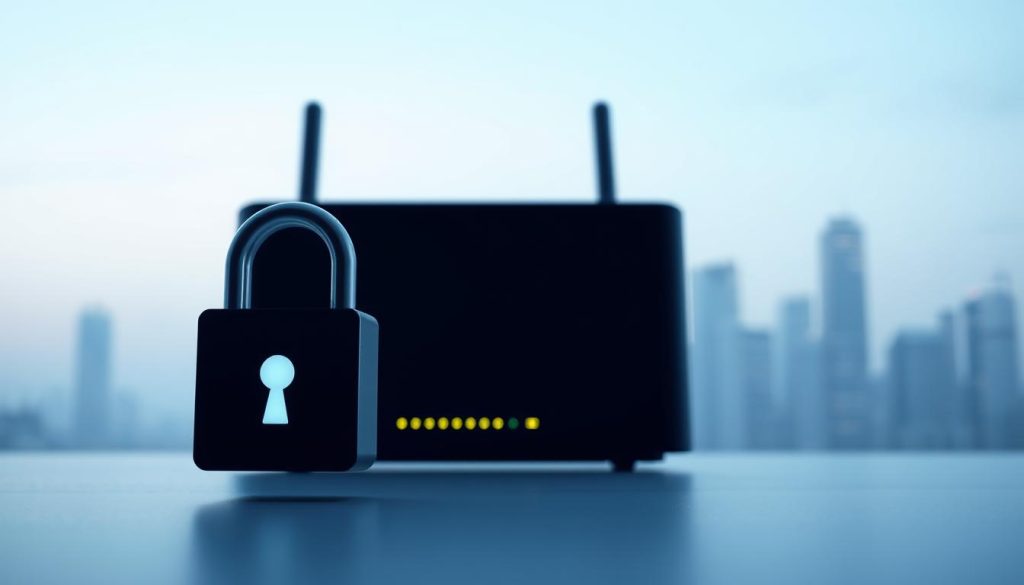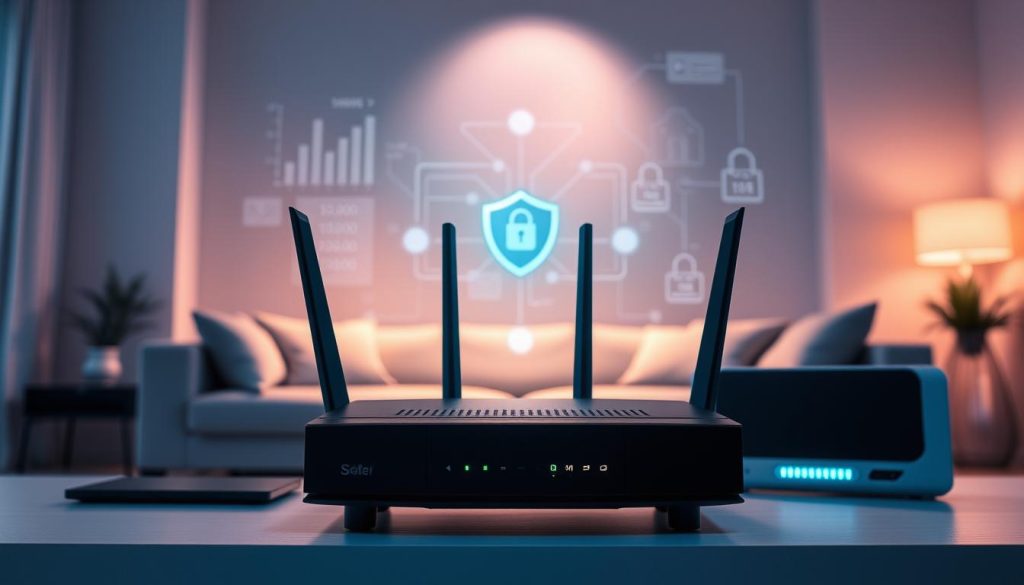Thinking about switching to 5G Home Internet? It’s key to know the privacy risks it might bring. 5G networks promise faster speeds and better connectivity. They’re getting more popular fast.
But, these new features raise concerns about your personal data safety. This article will show you the dangers. It will also give you tips on how to mitigate privacy risks. This way, you can enjoy a safe online world.
Key Takeaways
- Understand the potential privacy risks associated with 5G Home Internet.
- Learn how to secure your personal data on 5G networks.
- Discover practical tips to mitigate privacy risks.
- Explore the importance of network security in the 5G era.
- Find out how to protect your online identity.
Introduction to 5G Home Internet
Thinking about switching to 5G home internet? It’s important to know the basics. 5G home internet offers faster speeds and lower latency. This makes it great for homes with lots of devices online.
5G is changing how we connect to the internet. With faster download and upload speeds, it’s ready for 4K streaming, online gaming, and smart home devices. It works better than older internet technologies.
5G home internet might also be more reliable. It uses a different setup than traditional wired internet. This is good in places where cable or fiber internet isn’t available or reliable.
Key Features of 5G Home Internet
- Faster speeds: 5G offers significantly faster download and upload speeds.
- Lower latency: Reduced latency improves real-time applications like video conferencing and online gaming.
- Increased capacity: 5G can support more devices connected to the internet simultaneously.
| Feature | 5G Home Internet | Traditional Internet |
|---|---|---|
| Speed | Up to 10 Gbps | Up to 1 Gbps |
| Latency | As low as 1 ms | Typically 20-50 ms |
| Capacity | Supports a large number of devices | Limited by infrastructure |
Knowing these basics is key to understanding the privacy risks of 5G home internet. We’ll dive into those risks in the next sections.
Privacy Risks Associated with 5G Home Internet
Enjoying 5G Home Internet means knowing its privacy risks. The fast speeds and quick responses come with more data risks. Your home network is now a target for cyber threats, so you need strong security.
Increased Data Vulnerabilities: With 5G, your home network handles more data. This includes personal and financial info. Keeping your network safe is key to protecting this data.

Unsecured Devices on Your Network: More devices on your 5G network mean more security risks. Unsecured devices can let hackers in, putting your whole network at risk.
Concerns about Location Tracking: 5G also raises privacy worries about location tracking. Devices connected to your 5G network can track your location, which is a privacy issue.
To fight these risks, you must take strong security steps. Secure all devices on your network, use strong passwords, and update your router’s software regularly.
Cybersecurity Threats and 5G
As 5G spreads worldwide, it’s key to grasp the cybersecurity risks it brings. This new tech offers faster internet but also new vulnerabilities. These can be used by hackers.
Cybersecurity threats in 5G networks are complex. They include data breaches, malware attacks, and DDoS attacks. With 5G’s role in critical infrastructure and the IoT, strong security is a must.
The IoT greatly increases these risks. More devices on 5G networks mean more targets for hackers. This includes smart home gadgets, industrial sensors, and other IoT items with weak security.

To fight these risks, strong security steps are needed. This means updating software, using secure networks, and choosing strong passwords. Knowing about cyberattacks on 5G networks helps protect your home network.
By understanding 5G’s cybersecurity threats and acting early, you can lower your risk of cyberattacks. This ensures a safer online world for everyone.
Data Privacy and Personal Information
It’s important to know how 5G Home Internet affects your personal info. As you use it, you should understand how your data is used by providers.
5G Home Internet services gather a lot of personal data. This includes what you browse, your device info, and how you use it. They use this data to make your service better, show you ads, and improve your experience. But, it also makes you wonder about Data Privacy and how safe your info is.

To get a better idea of what data is collected, let’s look at what different providers might gather:
| Provider | Data Collected | Usage |
|---|---|---|
| Provider A | Browsing history, device info | Service improvement, targeted ads |
| Provider B | Usage patterns, location data | User experience enhancement, network optimization |
| Provider C | Device info, subscription details | Customer service, billing purposes |
It’s key to know about these practices and use Privacy Controls on your devices and through your provider. Checking your privacy settings often can help keep your info safe.
Also, it’s crucial to read the terms of service and privacy policies of your 5G Home Internet provider. These explain how your data is treated, stored, and kept safe. Knowing this lets you make smart choices about your data and privacy.
In summary, while 5G Home Internet has many benefits, it also requires careful Data Privacy practices. By staying informed and using privacy controls, you can protect your personal info better.
Mitigating Privacy Risks with 5G
Protecting your privacy is key to a safe 5G home internet experience. As 5G grows, knowing how to keep your data safe is more important than ever.
Using stronger encryption techniques is a big step in securing your 5G internet. Encryption turns your data into a secret code. This makes it hard for others to see your information.
Virtual Private Networks (VPNs) are also vital. They make a safe tunnel to the internet. This keeps your data safe from hackers. Pick a VPN that’s trusted and keeps no logs.

Setting up your network’s privacy controls is also crucial. This means using a secure router and strong passwords. Make sure your network isn’t open to strangers. Update your router often and use a guest network for IoT devices.
Comparison of VPN Features
| VPN Provider | Encryption Protocol | No-Logs Policy | Server Locations |
|---|---|---|---|
| ExpressVPN | OpenVPN, WireGuard | Yes | 3000+ servers in 94 countries |
| NordVPN | OpenVPN, IKEv2/IPSec | Yes | 5000+ servers in 60 countries |
| ProtonVPN | OpenVPN, WireGuard | Yes | 1700+ servers in 54 countries |
By taking these steps, you can greatly improve your privacy and security online. Always stay up to date with the latest security tips. And regularly check your privacy settings to keep your online world safe.
Device Management and Security
Keeping your devices safe is crucial for a secure 5G home network. With 5G’s fast speeds, protecting your devices from threats is key.
Regular updates are a must for device security. Make sure your devices’ software is always current. This helps fix security holes that hackers might use.
Strong passwords and security measures are also important. Use unique, complex passwords for all devices and accounts. A password manager can help with this. Also, turn on two-factor authentication (2FA) for extra security.
Best Practices for Device Security
- Regularly update your devices’ operating systems and software.
- Use strong, unique passwords and consider a password manager.
- Enable two-factor authentication (2FA) for added security.
- Monitor your devices for suspicious activity.
- Use reputable security software to protect against malware and viruses.
Keeping your Home Network Security strong is also key. Place your router in a safe spot to avoid physical access. Change your router’s admin password and use a strong Wi-Fi password. Segmenting your network can also help, keeping IoT devices separate from others.
| Security Measure | Description | Benefit |
|---|---|---|
| Regular Updates | Keep devices’ OS and software updated. | Fixes security vulnerabilities. |
| Strong Passwords | Use complex, unique passwords. | Prevents unauthorized access. |
| Two-Factor Authentication | Add an extra layer of security. | Enhances account security. |
By following these tips and staying alert, you can greatly improve your Internet Security. Always check and update your security steps to fight off new threats.
Understanding Terms of Service
It’s key to understand the terms of service when picking a 5G Home Internet provider. This ensures they respect your online privacy. Always read and get the terms and privacy policies before signing up.
The terms of service tell you the rules for using the service. Privacy policies explain how they handle your personal data. Look closely at parts about data sharing, encryption, and your rights.
Watch out for vague language or broad data sharing permissions in the terms. A good provider should be clear about their data handling.
Key Elements to Look for in Terms of Service
- Data Collection and Usage: Understand what data is collected and how it is used.
- Data Sharing: Check if your data is shared with third parties and under what circumstances.
- Data Protection: Look for information on how your data is protected against unauthorized access.
- User Rights: Know your rights regarding your data, including the right to access, correct, or delete your data.
Here’s a comparison of key elements across major 5G Home Internet providers:
| Provider | Data Collection | Data Sharing | Data Protection |
|---|---|---|---|
| Provider A | Collects browsing history and personal info | Shares with third-party advertisers | Uses encryption and secure servers |
| Provider B | Collects usage data and device info | Does not share with third parties | Employs robust encryption and regular security audits |
| Provider C | Collects minimal data, focusing on service quality | Shares data only for legal compliance | Utilizes advanced security measures, including two-factor authentication |
By carefully reviewing the terms and privacy policies, you can make a smart choice. Choose a provider that is open about their practices for better privacy.
Public Perception and Privacy
Learning about 5G Home Internet privacy risks is key. As you explore this new tech, think about how public views affect your privacy awareness.
Views on 5G privacy risks differ among people. Some worry about more data collection. Others see the fast internet benefits. Knowing these views helps you use 5G Home Internet wisely.
To avoid privacy issues, stay updated on 5G technology. Learn how your data is handled by providers. This knowledge helps protect your privacy.
Here are important tips for 5G Home Internet privacy:
- Check your service provider’s privacy policy often.
- Use strong passwords and update your router’s software.
- Be careful sharing personal info online.
By following these tips, you can keep your privacy safe while enjoying 5G Home Internet.
Regulatory Framework Surrounding 5G
It’s important to know about the rules for 5G to handle its risks. As 5G grows, governments and rules makers are key in its growth and use.
The regulatory framework for 5G includes laws and guidelines. These are to make sure 5G is safe and used right. They also tackle 5G risks like cyber threats and privacy issues.
Rules makers are setting up privacy controls to keep user data safe. They make sure 5G providers follow strict privacy rules. This includes checks and penalties for not following the rules.
The rules for 5G differ by country. In the U.S., the Federal Communications Commission (FCC) is in charge of 5G rules. Knowing these rules helps everyone use 5G wisely.
As 5G spreads, knowing the rules and their impact on privacy and security is key. Understanding these efforts helps us see how our privacy and security are being protected in this new era.
The Future of Privacy in a 5G World
The future of privacy in a 5G world is a big concern. As 5G technology grows, we need to think about new privacy solutions. These will shape how we protect our online privacy.
Edge computing is a big step in 5G. It makes data processing faster and more secure. But, it also means more data is stored and processed at the edge, raising privacy concerns.
To tackle these issues, privacy-enhancing technologies like encryption and anonymization are being created. These tools will be key in keeping user data safe in the 5G era.
| Trend | Description | Impact on Privacy |
|---|---|---|
| Increased Use of AI | AI will be used to enhance 5G security and personalize user experiences. | Potential for increased data collection and surveillance. |
| Edge Computing | Data processing will occur closer to the user, reducing latency. | Raises concerns about data storage and security at the edge. |
| Enhanced Encryption | Improved encryption methods will protect user data. | Positive impact on privacy, making data more secure. |
To keep up with 5G privacy challenges, stay updated on the latest 5G and privacy tech. This way, you can protect your online privacy proactively.
The future of privacy in a 5G world is complex. But, by understanding new trends and technologies, you can handle the challenges and opportunities 5G brings.
Conclusion: Staying Safe with 5G Home Internet
Exploring 5G Home Internet means being aware and taking steps to stay safe. Knowing the privacy risks helps you protect your personal info. This keeps your home network secure.
Keep your devices updated and use strong passwords. Also, read Terms of Service carefully. This way, you can enjoy 5G while avoiding risks.
Keeping your online space safe is a continuous effort. Stay updated on cybersecurity threats and new rules. This helps you protect your privacy in the 5G world.

